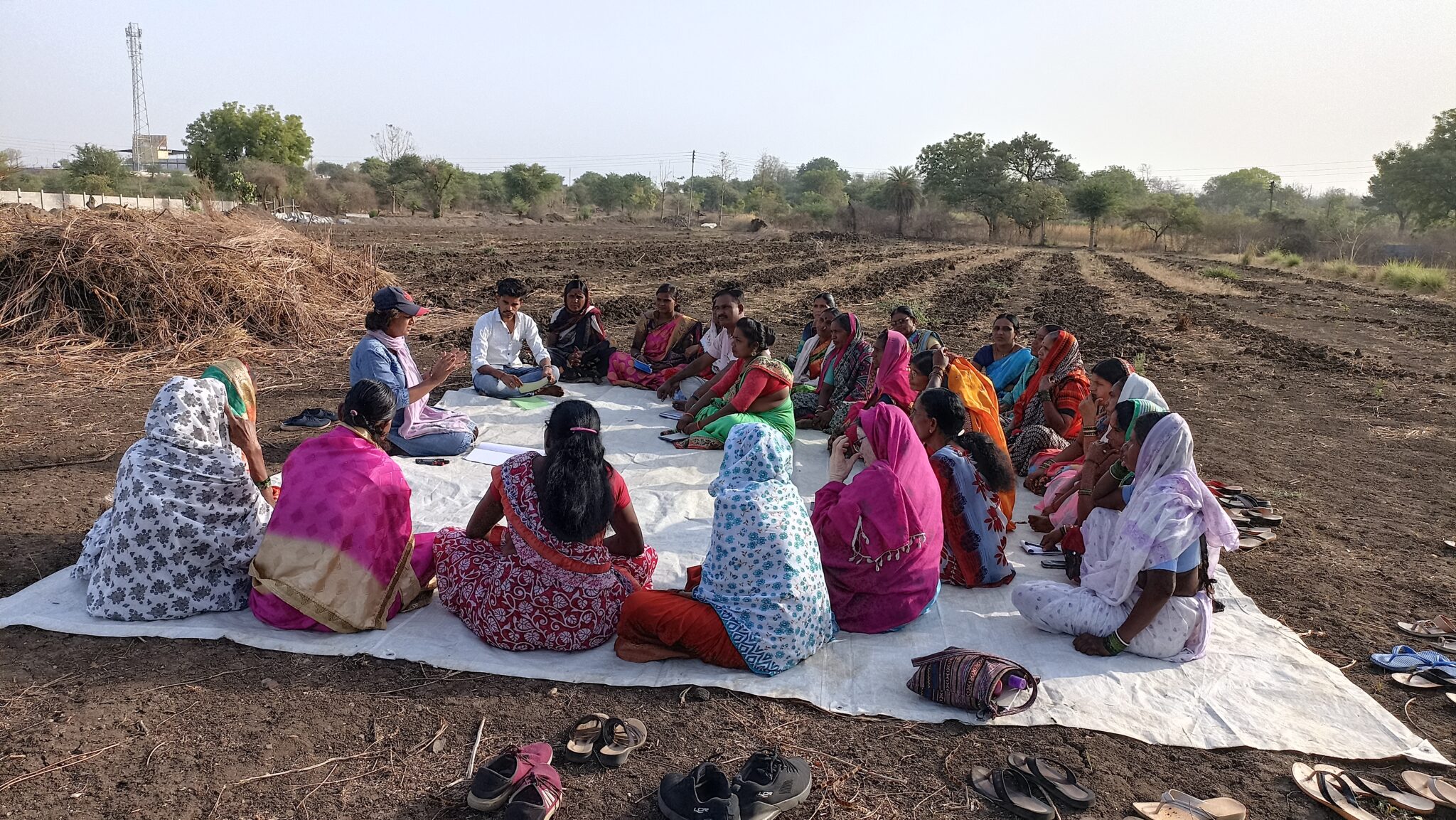Agroecology Fund grantee partner, the Society for Promoting Participative Ecosystem Management (SOPPECOM) and a key network to which it belongs, the Mahila Kisan Adhikaar Manch (MAKAAM, Forum for Women Farmers’ Rights), support women—primarily single women with little or no access to land, and sugarcane workers—to transition to agroecology. This work emphasizes the strengthening of local food and agricultural systems with the use of local seed varieties, no chemical inputs and drawing on women’s knowledge. Since its inception in 1991, SOPPECOM has worked at the intersection of water and rural livelihoods. Since 2015 they have been advocating for women’s land rights and their status in rural Maharashtra, with an emphasis on women from farmer suicide households. Over 557 farmers died by suicide in the first half of 2024 alone in five Maharashtra districts, many by poisoning themselves with agrochemicals. In 2023, nearly 3000 farmers in Maharashtra took their own lives amid worsening financial distress, and more than 100,000 farmer suicides occurred across India in the last decade. Some of the key issues faced by the women left behind by these devastating circumstances include: stigma and social exclusion; lack of land titles and poor access to credit; no incentives to make an exit from the chemical-based farming that led to farm suicides; and increasing indebtedness, especially from local money lenders and micro-finance institutions.
With grant support from the Agroecology Fund, in 2023 SOPPECOM led more than 200 of these women from across six districts in the Maharashtra state of India to transition into agroecology and away from the detrimental industrial model. Chemical intensive agriculture is commonly practiced in these regions, and the main crops cultivated are often grown as monocrops, such as Bt cotton, soybean and pigeon pea. These crops, in addition to being unprofitable and highly vulnerable to climate changes, are not a source of food for these women and their families. The harsh realities of this model have contributed greatly to the farmer suicide epidemic.
The primary efforts of SOPPECOM’s work in this region for the grant cycle included providing women farmers with seeds and gender-appropriate tools easy for women to use on their own, and training and capacity building to support their sustainable farming practices. One of the most important unplanned components of the work that emerged was the natural formation of collectives among women farmers, where learning and exchange now occurs alongside advocacy for local governmental support. Also, farms have been diversified beyond monocultures to include up to 30 different crop varieties, many of which are now consumed locally. Some women were even able to cultivate enough to sell, which provided them with extra financial stability.
“By doing this kind of farming, we got to eat and to share. If there is only cotton farming, there is nothing to really share as all of it goes only to the market”. – Anita Tai, farmer
An early success, this initiative provided communities with the confidence to consider expanding the program to new districts and to deepen engagement in the current areas. It has also fostered leadership skills among women farmers, many of whom have taken on roles as village-level agroecology champions mentoring others to drive agroecological transformations within their communities.
This collaborative effort set out to challenge both existing social structures (caste, patriarchy, ethnicity) and the corporate-controlled chemical intensive agrarian paradigm. To document these efforts, SOPPECOM and MAKAAM interviewed some of the women participants to share first hand their experiences and knowledge. In Women Farmers Lead the Way, the six part video series below, you’ll hear from a ‘lower caste’ or Dalit woman from Beed who shared her sense of pride when upper caste women asked her about her farm and requested seeds from her; a farm widow who saw respect in the eyes of her father-in-law who once scorned her and blamed her for his son’s suicide; a husband who derided the agroecology model but now respects his wife and joins her in her endeavor; and an Indigenous woman who became so convinced about the potential of agroecology that she increased the area of farming with this approach from half an acre to 12 acres, and then influenced others to do the same.
These stories share common themes—empowerment, community connection and self-reliance—all made possible through the cultivation of the community-centric values of growing healthy food outside of the industrial food system. Access to knowledge, tools, and support can be life changing for rural women with little access to capital, land, or ways to make a living on their own. It’s always inspiring to the Agroecology Fund to see how even small investments into grassroots agroecology movements can result in huge impacts on a local level, and even set in motion the mycelial-like growth of community networks required to scale agroecology. Learn more about how SOPPECOM and MAKAAM are building power in rural communities across India to scale grassroots agroecology movements that advance food security, gender equity, and climate resilience to local communities.
